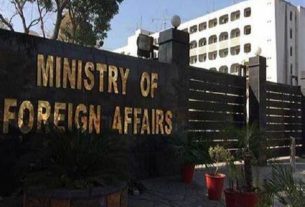BEIJING: The working teams of China and the European Commission (EC) have maintained close communication and stepped up the consultations, the Ministry of Commerce (MOFCOM) confirmed on Thursday, responding to a question on the launch of consultations between China and the EU on the anti-subsidy investigation into Chinese electric vehicles (EVs) initiated by the EU.
China has always maintained that trade frictions should be properly handled through dialogue and consultations. Chinese officials have repeatedly expressed serious concerns and firm opposition to the anti-subsidy investigation into China’s EVs initiated by the EC, He Yadong, a spokesperson for MOFCOM said on Thursday during a routine press briefing.
The remarks were a response to a question of whether China-EU consultations could follow the solution of the China-EU trade dispute on photovoltaic products dating back to 2013 when minimum import prices and limited import quantity were set.
On Saturday, China and the EU agreed to launch consultations on the issue of the EU’s anti-subsidy investigation into Chinese EVs, during a video meeting between Chinese Commerce Minister Wang Wentao and Valdis Dombrovskis, executive vice president of the EC.
China-EU cooperation is in essence complementary and mutually beneficial. There is broad space for cooperation between the two sides in the field of green transformation, He said.
“We hope that the EU can work with China in the same direction to push for progress in consultations as soon as possible and reach a solution acceptable to both sides so as to avoid the escalation of trade frictions and a negative impact on China-EU economic and trade relations,” the spokesperson noted.
Industry observers said that the Chinese side has shown its utmost sincerity in seeking to resolve disputes through consultations. If the EC insists on imposing additional tariffs on Chinese EVs despite China’s efforts to conduct friendly consultation, it will lead to material damage on overall China-EU relations.
China and the EU are each other’s major trading and investment partners, and their industrial and supply chains are closely linked. For disputes in areas such as EVs, the two sides should resolve them through negotiations, rather than embroiling them in geopolitical conflicts with the threat of protectionist measures, Ding Chun, director of the Center for European Studies at Fudan University, told the Global Times.
The EC’s decision to impose additional tariffs on EVs imported from China will not only impact Chinese branded cars, but also will act as a source of disruption to the transformation and upgrading of the global EV industry, Cui Fan, a professor of University of International Business and Economics, said at a round table dialogue on development and cooperation opportunities for China’s new-energy vehicle industry held on Thursday in Beijing.
Observers pointed out that the EC’s intended tariffs on Chinese EVs harm others without delivering any benefit to the bloc, which will also potentially apply to global brand vehicles manufactured in China, as the tariffs target cars imported from China.
A large part of China’s EVs exported to Europe were originally produced in China by European and US car companies before being re-exported to Europe, according to statistics from the European Federation for Transport and Environment (T&E).
Shanghai-made Tesla cars accounted for 28 percent of Chinese EVs sales in Europe in 2023, while Renault’s Dacia accounted for 20 percent. BMW cars held a share of 6 percent while other European brands also accounted for a similar share, T&E data showed.
If China exports fewer EVs, the demand for inputs for production from the EU will also fall. Overall, EU exports to China would likely fall by over $600 million without China having responded with its own tariff measures, according to a report by Germany-based Kiel Institute for the World Economy.
For EU consumers, the additional tariffs on Chinese EVs will likely result in higher prices because production within the EU is significantly more expensive than in China due to higher energy and material prices and, above all, significantly higher labor costs, a trade researcher at the Kiel Institute said in the report.__Courtesy Pakistan Today





